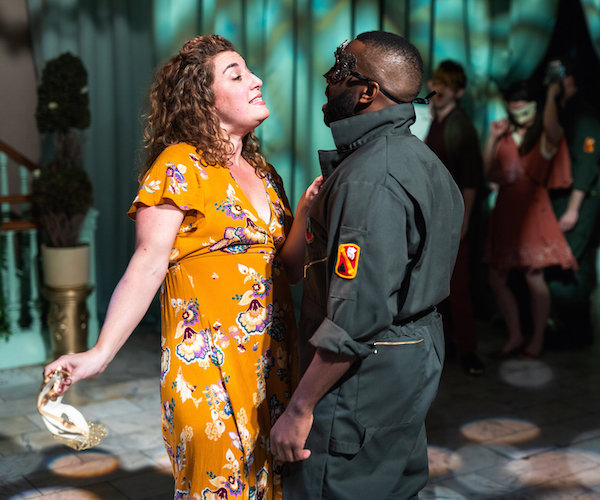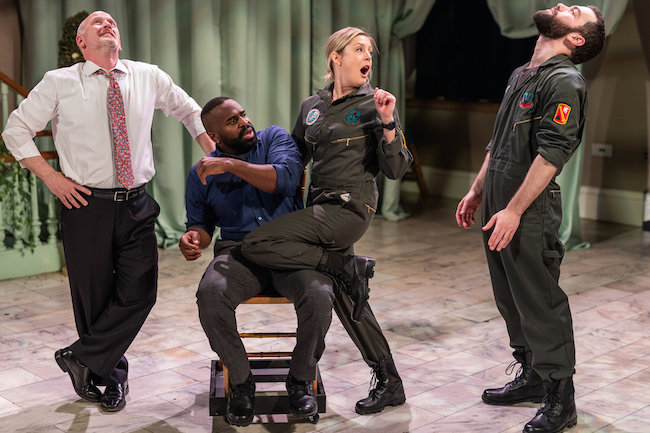Theater Review: “Much Ado” About Something New
Shining leads make up for a problem play that, in this production, has been further problematized.
Much Ado About Nothing by William Shakespeare. Directed by Christopher V. Edwards. Staged by the Actors’ Shakespeare Project at Cambridge Multicultural Center, Cambridge, MA, through May 6.

Beatrice (Brooke Hardman) and Benedick (Omar Robinson) in the ASP production of “Much Ado About Nothing.” Photo: Nile Scott Shots.
By Kamela Dolinova
Here’s the TL;DR about this production before it closes this Sunday: go see it. Actors’ Shakespeare Project has concocted a joyous, heartfelt, beguiling Much Ado, full of music and passion and springtime. Omar Robinson and Brooke Hardman may be the most winning Benedick and Beatrice I’ve ever had the opportunity to enjoy.
The longer story is that this is a play with a problem at its core. And the ASP production, instead of trying to solve the obvious difficulty, problematizes it further. So, in the case of this production, as with so much of Shakespeare, the complete success of the staging will somewhat depend on how far contemporary audiences can suspend their disbelief.
Much Ado is Shakespeare’s first foray into a favorite theme he spends his twilight years perfecting, through Othello, Pericles, Cymbeline, and finally The Winter’s Tale: misplaced jealousy, martyred innocence, repentance, and resurrection. The problem arises when the wedding/accusation scene interrupts a play which, thus far, has been largely been made up of jokes, flirtations, and the summertime partying of soldiers returned from war to an idyllic Italian villa. The scene is intense, cruel and, in a modern context, makes very little sense: Claudio shames Hero (because of a false accusation of infidelity) in front of her friends and family, at the altar, calling her a “rotten orange” and throwing her off. Afterward, when Hero faints and appears dead, her father Leonato gives an impassioned speech imploring her to stay dead, believing it a better fate than her shame; he goes so far as to wish she had never been born.
This scene always plays oddly in modern adaptations. But, even in more period settings, it’s difficult to forgive Claudio, Don Pedro, or Leonato afterward. But in a setting where Leonato’s request for “That song again” is answered by a strummed guitar and the words, “Red cups and sweaty bodies everywhere…” it’s especially hard to accept such a harsh response to the idea that Hero has been less than chaste.
Complicating this question, though, is an even bolder choice made by this production: Claudio is cast as female, played by Esme Allen. It should be noted that Allen is by far the best Claudio I have ever seen: her butchy camaraderie with her fellow soldiers is utterly genuine, her passion for Hero adorable, her altarside denunciation approaching the understandable. Hero, too, is vividly wrought by Lydia Barnett-Mulligan, who makes a usually bland figure funny, charming, and worthy of our sympathy.
The odd part of all of this is that this queer couple is utter normalized by the other characters – in particular, Leonato. There is not a single suggestion that Hero’s highly traditional father has any problem with his only child being gay, nor that, in place of her lady-in-waiting, Margaret, she has a gender-nonconforming male “friend,” Garet. In fact, aside from some misgendering jokes about Borachio (a dead-sexy turn by the punky Abigail Dickson) at Dogberry’s expense, the production creates a world where queerness is as lawful as eating. The fact that the governor’s only daughter is marrying a female soldier is accepted as a proud and natural match to be celebrated by the military and powerful politicians alike.
Granted, this is a world I’m thrilled to spend time in. But it makes Claudio’s, and especially Leonato’s, response at the altar make even less sense than in traditional productions. One explanation for the conflict that could have worked: the so-called “gold-star lesbian” argument. This female Claudio is furious and heartbroken that Hero has cheated on her with a man. The line “Talk with a man out a window” and similar dialogue was not altered. But the “man” in question in this production was Borachio — also a woman, and played as such! Garet plays the part of Hero in the plot, just as Margaret usually does — and he is dressed in her garments and wears a wig. Borachio, though, plays herself in the window-scene. Though her shaved head and masculine uniform generate confusion for Dogberry. there’s never any indication that anyone else mistakes her for a man.
Even if Claudio’s reaction could make sense, it is hard to understand Leonato’s. A father old-fashioned enough to conclude he’d rather see his daughter die than have her chastity impugned? It is pretty outrageous in a modern setting, but can be gotten around. But his feeling this way about his daughter having been with a man before marrying a woman .. that crosses the line into creepy. What should a woman’s dad care whether she’s a gold-star lesbian or not? The scene usually hits some wrong notes as part of the Bard’s springy comedy: in this adaptation it felt particularly out of tune.

Mark Soucy as Leonato, Omar Robinson as Benedick, Esme Allen as Claudio, and Avery Bargar as Don Pedro in the ASP production of “Much Ado About Nothing.” Photo: Nile Scott Shots
Yet despite this strange set of choices, the ASP cast wrings every funny moment and heartfelt emotion out of the text: the evening is always entertaining. The soul of Much Ado, after all, is Beatrice and Benedick, and the pairing works from the get-go. Hardman delivers her first line to Robinson’s Benedick, “I wonder that you will still be talking,” from the balcony above the stage. One imagines that she has retreated there, arranging her look just so, before gazing down at him and grabbing his attention for the first time. When Robinson is going on and on about her to Don Pedro afterward, the thought easily comes to mind: Wow, he just can’t stop talking about her, can he? Their chemistry is so on that the wit crackles and the frustration seethes over a barely-concealed affection they are both too stubborn to admit. When they finally do, in the intimacy that so often follows tragedy in Shakespeare, it comes off as love that has been there for years, waiting to be awakened by events too powerful to ignore.
The rest of the production glides along, buoyed by its splendid ensemble. Avery Bargar, who I enjoyed in Proof earlier this year, brings his sensitive-bro vibe to Don Pedro; his proposal to Beatrice is played as sincere, and it’s a lovely and heartbreaking moment when Beatrice laughs it off. Leonato is everything he should be: grand, kind, fiery, loving, and quite terrifying in the wedding scene (though this didn’t mitigate the aforementioned issue). Andrew Prensky’s Garet is a fun and sexy presence, adding sassy wit to the proceedings, and doubling ably as Dogberry’s hapless assistant, Verges. And Alejandro Simoes, who first appears in the thankless role of Don Jon (aka, boringest villain ever), turns in a hilarious Dogberry, whose English is mangled not by stupidity but by an overconfidence in his second language. I struggled slightly with whether his performance, complete with Latin American accent and sprinklings of Spanish, was offensive. I am still unclear on how I feel about it, as a white person. But, for what it’s worth, the performer himself would appear to be Latinx, and his turn didn’t partake in any stereotypes about Latinx people that I know of. This Dogberry travels about on a hoverboard (an inevitably funny conveyance), wearing a bike helmet and a yellow rain poncho. He over-relies (hilariously) attempting to intimidate others by putting on and removing a pair of mirrored sunglasses. A unique set of behaviors, indeed, and perhaps, for all intents and purposes, “too cunning to be understood.”
The Multicultural Center in Cambridge supplies a beautiful stage area that the ASP uses well; the set is festooned with hanging ivy and the marble stage and stairs help wrap audience members in a dream of southern Italy. The sound design – including “Sigh No More, Ladies” mashed up with that Miley Cyrus song – arouses continual delight and humor. The actors make good use of guitars and a piano as well as their own wonderful voices. Overall, this Much Ado, despite some conceptual oddness, is that rare theatrical experience — the deeply-felt romp.
Kamela Dolinova is a writer, actor, director, healer, and person with too many jobs. She loves the community and little theatre scenes in Boston, and has recently enjoyed working with Flat Earth Theatre, Theatre@First, and Maiden Phoenix Theatre Company. She also blogs at Power In Your Hands.
